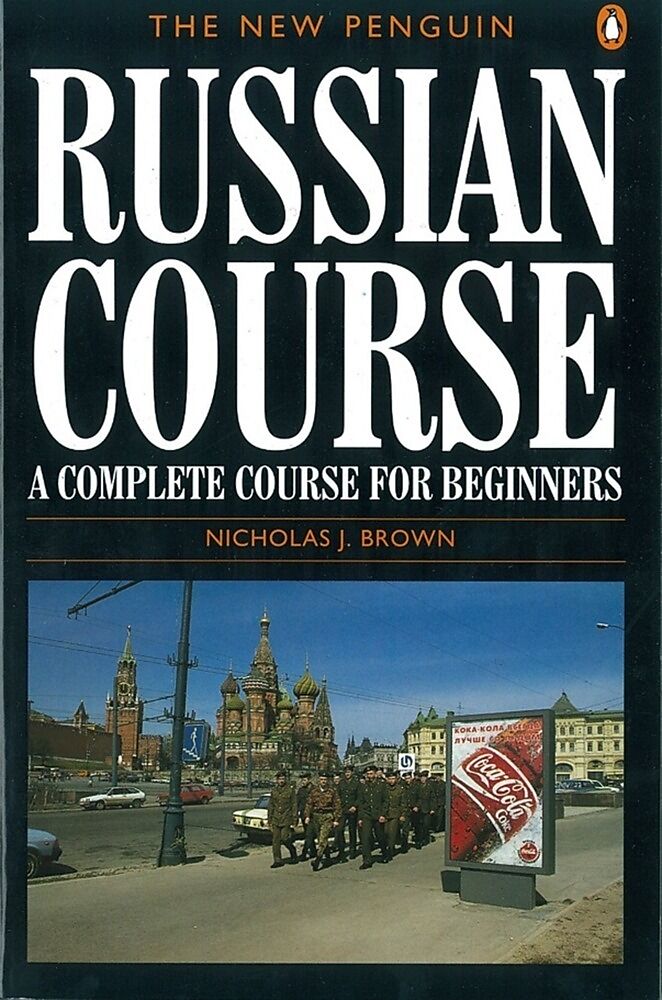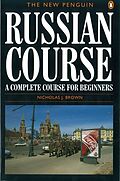

The New Penguin Russian Course
Beschreibung
Informationen zum Autor Nicholas J. Brown Klappentext Whether you're learning alone or attending classes, you'll find this complete Russian language course for beginners both accessible and indispensable. Designed to provide the student with an excellent comma...Format auswählen
- Kartonierter EinbandCHF 20.30
Wird oft zusammen gekauft
Andere Kunden kauften auch
Beschreibung
Informationen zum Autor Nicholas J. Brown Klappentext Whether you're learning alone or attending classes, you'll find this complete Russian language course for beginners both accessible and indispensable. Designed to provide the student with an excellent command of basic Russian (the equivalent of A' level standard) the book features thirty lessons punctuated by revision exercises to ensure you have fully understood what you have learned. The emphasis is on acquiring vocabulary, experiencing conversational language and learning useful grammar. The book also includes a vocabulary of 1,500 words and a glossary of grammatical terms. Zusammenfassung Whether you're learning alone or attending classes, you'll find this complete Russian language course for beginners both accessible and indispensable. Designed to provide the student with an excellent command of basic Russian (the equivalent of A' level standard) the book features thirty lessons punctuated by revision exercises to ensure you have fully understood what you have learned. The emphasis is on acquiring vocabulary, experiencing conversational language and learning useful grammar. The book also includes a vocabulary of 1,500 words and a glossary of grammatical terms. Inhaltsverzeichnis The New Penguin Russian CourseIntroduction Acknowledgments 1. Learning to Read Russian Alphabet and Pronunciation; Transliteration; Street Signs 2. Russian Handwriting; More on Pronunciation 3. Everyday Phrases; Basic Grammar Naming Things; Basic Grammar; Gender; Map of Russia 4. Doing Things - Verbs; Personal Pronouns Present Tense; Conjugations; Word Stress; Nouns and Cases; Conversation in the Metro 5. Asking Questions; The Prepositional Case Indeclinable Nouns; Dialogues 6. Possession; Going Places; The Accusative Case Russian Personal Names; Dialogues 7. Describing Things: Adjectives Masculine, Feminine and Neuter Adjectives; "What kind of...?"; "This" and "That"; Prepositional and Accusative Cases of Adjectives; Adverbs; Moscow Street Map 8. Plurals; Spelling Rules; Buying Things Spelling Rule 1; "Is There...?"; Spelling Rule 2; Map of Europe 9. Numbers; The Genitive Case 1-5,000; Genitive Singular and Plural; Quantities; Roubles and Dollars; Buying Things; Street Market 10. "To Have"; More on the Genitive Genitive Pronouns; "There Isn't"; Prepositions Taking the Genitive; Genitive of Adjectives; "Whether"; Dialogues 11. The Past; Reflexive Verbs The Founding of St. Petersburg 12. The Future; Aspect; The Dative Case Imperfective and Perfective; "To Want"; Dative; "To Give"; "To Please"; Spelling Rules 3 and 4; Prepositional Plural; In the Restaurant; Visiting Friends 13. Aspect in the Past; Use of Tenses Aspect of the Infinitive; Reported Speech; More about "Whether"; Dialogue 14. Aspect in the Future; Impersonal Constructions Dialogue 15. Requests and the Imperative Summary of Aspect Use; Two Lost Tourists; Phoning a Bureaucrat 16. The Instrumental Case TOT and TÓT; Declension of Surnames; A Family at Home; Volodia and the KGB 17. Time, Date, Age; Ordinal Numbers Months; Years; The Daily Life of Chaikovskii (Tchaikovsky) 18. The Comparative; Superlatives; Relative Clauses with ("Who," "Which"); Victor Wants to Meet Mary; Siberian Superlatives; Map of Siberia 19. The Conditional; Obligation; Prefixes Mary Seeks an Absent-Minded Professor 20. Verbs of Motion: Going, Running, Bringing Travelling Around; Tania in Motion 21. Possession; Purpose Mr. Thornwaite Doesn't Like His Hotel; Was Turgenev a Revolutionary? 22. Fun with Numbers Declension of Numbers; "Both"; Collective Numerals; Fractions; Soviet Divorce Statistics 23. Time Expressions "When?"; "How...
Autorentext
Nicholas J. Brown
Klappentext
Whether you're learning alone or attending classes, you'll find this complete Russian language course for beginners both accessible and indispensable. Designed to provide the student with an excellent command of basic Russian (the equivalent of A' level standard) the book features thirty lessons punctuated by revision exercises to ensure you have fully understood what you have learned. The emphasis is on acquiring vocabulary, experiencing conversational language and learning useful grammar. The book also includes a vocabulary of 1,500 words and a glossary of grammatical terms.
Zusammenfassung
Whether you’re learning alone or attending classes, you’ll find this complete Russian language course for beginners both accessible and indispensable. Designed to provide the student with an excellent command of basic Russian (the equivalent of A’ level standard) the book features thirty lessons punctuated by revision exercises to ensure you have fully understood what you have learned. The emphasis is on acquiring vocabulary, experiencing conversational language and learning useful grammar. The book also includes a vocabulary of 1,500 words and a glossary of grammatical terms.
Inhalt
The New Penguin Russian CourseIntroduction
Acknowledgments
1. Learning to Read Russian
Alphabet and Pronunciation; Transliteration; Street Signs
2. Russian Handwriting; More on Pronunciation
3. Everyday Phrases; Basic Grammar
Naming Things; Basic Grammar; Gender; Map of Russia4. Doing Things - Verbs; Personal Pronouns
Present Tense; Conjugations; Word Stress; Nouns and Cases; Conversation in the Metro5. Asking Questions; The Prepositional Case
Indeclinable Nouns; Dialogues6. Possession; Going Places; The Accusative Case
Russian Personal Names; Dialogues7. Describing Things: Adjectives
Masculine, Feminine and Neuter Adjectives; "What kind of...?"; "This" and "That"; Prepositional and Accusative Cases of Adjectives; Adverbs; Moscow Street Map8. Plurals; Spelling Rules; Buying Things
Spelling Rule 1; "Is There...?"; Spelling Rule 2; Map of Europe9. Numbers; The Genitive Case
1-5,000; Genitive Singular and Plural; Quantities; Roubles and Dollars; Buying Things; Street Market10. "To Have"; More on the Genitive
Genitive Pronouns; "There Isn't"; Prepositions Taking the Genitive; Genitive of Adjectives; "Whether"; Dialogues11. The Past; Reflexive Verbs
The Founding of St. Petersburg12. The Future; Aspect; The Dative Case
Imperfective and Perfective; "To Want"; Dative; "To Give"; "To Please"; Spelling Rules 3 and 4; Prepositional Plural; In the Restaurant; Visiting Friends13. Aspect in the Past; Use of Tenses
Aspect of the Infinitive; Reported Speech; More about "Whether"; Dialogue14. Aspect in the Future; Impersonal Constructions
Dialogue15. Requests and the Imperative
Summary of Aspect Use; Two Lost Tourists; Phoning a Bureaucrat16. The Instrumental Case
TOT and TÓT; Declension of Surnames; A Family at Home; Volodia and the KGB17. Time, Date, Age; Ordinal Numbers
Months; Years; The Daily Life of Chaikovskii (Tchaikovsky)18. The Comparative; Superlatives; Relative Clauses with
("Who," "Which"); Victor Wants to Meet Mary; Siberian Superlatives; Map of Siberia19. The Conditional; Obligation; Prefixes
Mary Seeks an Absent-Minded Professor20. Verbs of Motion: Going, Running, Bringing
Travelling Around; Tania in Motion21. Possession; Purpose
Mr. Thornwaite Doesn't Like His Hotel; Was Turgenev a Revolutionary?22. Fun with Numbers
Declension of Numbers; "Both"; Collective Numerals; Fractions; Soviet Divorce Statistics23. Time Expressions
"When?"; "How Long?"; Vadim and Eva; Mr. Kuznetsov and Mr. Pope24. Negation; Place of He
Nothing, Nobody, Never; A Pineapple, but No Bananas25. Diminutives; Proper Names; Politeness
"The Fox and the Rolling-Pin"26. Indefinite Pronouns; Word Order; Writing Letters
A Letter to Mrs. Pope27. Participles: Types and Stress
A Classic Film28. Verbal Adverbs
Peter the Great; A Recipe for Mushroom Solianka**29. "Bookish" Style; Active Participles; Punctuation; Short-Form Adject…
